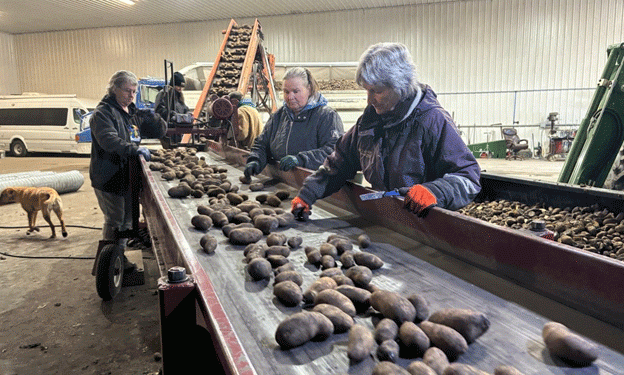Manitoba’s Potato Sector Under Pressure as Processors Pull Back
A wave of unexpected order reductions from major buyers like McCain Foods and J.R. Simplot Company has left Manitoba’s seed and table potato growers in a precarious situation. According to recent reports, producers are facing order cuts ranging from 10% to 100%, threatening significant financial losses and throwing the 2025 planting season into disarray.
One of the hardest-hit groups is the province’s seed potato growers, who now find themselves holding large inventories of unsold seed stock with few immediate options for recovery.
“Some of the larger seed growers are going to be losing at least $1 million, maybe more, worth of seed that they have in storage that might not have a home,” said Mark Peters, owner of Spruce Drive Farms near Portage la Prairie.
The Numbers Behind the Shock
Manitoba is Canada’s second-largest potato-producing province, contributing 21.6% of national production in 2024, according to Statistics Canada. The sector is integral not only to the province’s ag economy but also to the frozen food supply chain across North America.
- In 2024, Canada produced approximately 5.9 million tonnes of potatoes, with Manitoba contributing over 1.27 million tonnes.
- Seed potatoes account for a significant portion of this, serving both domestic and export markets.
- Two multinational processors, McCain and Simplot, dominate procurement in the region—making growers heavily dependent on their contract stability.
The recent contract reductions appear linked to broader market forces, including tariff-related trade tensions with the United States and demand adjustments downstream in the frozen and processed foods sector.
Trade Disruption and Tariff Fallout
While official explanations for the order cuts remain unclear, many within the industry suspect that ongoing trade issues, including tariffs on Canadian agricultural exports, are playing a key role.
Progressive Conservative MLA Jeff Bereza, agriculture critic for Portage la Prairie, stated that both potato and canola growers are being affected by these trade frictions.
“It’s something that we should have been working on months ago,” said Bereza, criticizing the government’s $100 million contingency fund as insufficient given the scale of the losses.
The situation echoes warnings from farm organizations and trade experts who have cautioned that supply chain interdependence between Canada and the U.S. remains fragile. Any disruption—whether political, economic, or environmental—can quickly ripple back to primary producers.
Producers Face Difficult Choices
With the spring planting window closing in, growers are scrambling to make decisions about what—and how much—to plant. Unsold seed potatoes, if not used or sold quickly, risk becoming waste.
“Do we ship it somewhere else? Do we just toss it? We’re trying to figure that out now,” said Peters.
Adding to the complexity is the fact that Manitoba’s seed potato growers form a tight-knit group, committed to avoiding undercutting one another on pricing. This limits the options for rapid inventory clearance and complicates negotiations with alternative buyers.
Meanwhile, industry groups like Keystone Agricultural Producers are in ongoing talks with processors, while the provincial government is exploring further support measures.
Manitoba’s potato growers are confronting a sudden and severe challenge, as contract reductions from major processors threaten millions in losses and destabilize planting plans. The episode highlights the vulnerability of specialized crop sectors to global market shocks and underlines the need for stronger trade protections, diversified markets, and responsive support systems. As the 2025 growing season looms, timely decisions and coordinated action will be crucial to keeping Manitoba’s potato industry on solid ground.







